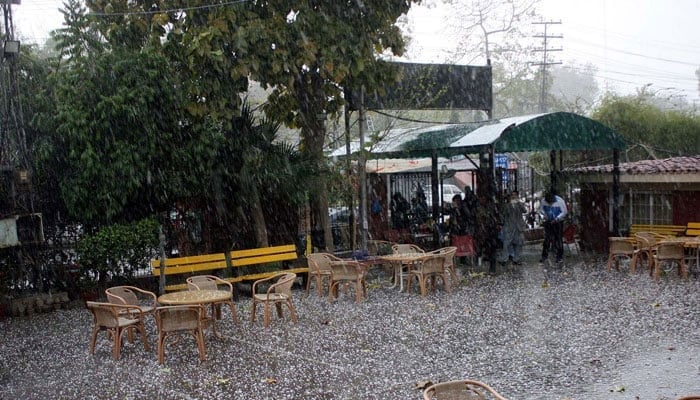Heat, hail, havoc
What is usually refreshing change in weather turned into terrifying ordeal, with residents scrambling for shelter
In a scene that felt ripped from a dystopian novel, golf ball-sized hailstones pounded Islamabad and parts of Khyber Pakhtunkhwa (KP) on Wednesday. The storm’s intensity was severe, damaging buildings and vehicles, and injuring several people. What is usually a refreshing change in weather turned into a terrifying ordeal, with residents scrambling for shelter. Coincidentally, the day also marked the anniversary of last year’s record-breaking rains in the United Arab Emirates, which had brought life to a standstill. This latest episode is a stark reminder of the many faces of climate change – unpredictable, destructive and increasingly frequent. It is also a reminder of the global nature of the crisis, emphasising the urgent need for developed nations to stop backtracking on their climate financing pledges to vulnerable countries like Pakistan.
What made the hailstorm even more surprising was that just days earlier, the Meteorological Department had issued a nationwide heatwave warning. Temperatures in Sindh and Punjab were expected to rise 6–8 Celsius above the seasonal average. This dramatic swing from heat to hail makes one thing clear: climate change is no longer a distant threat. It is here, and it is catching people off guard. This situation isn’t solely a result of government inaction. Yes, the stakes for international responsibility are high, but Pakistan must also accept that, for the most part, we are on our own. Our unchecked interference with natural ecosystems, all in the name of development, must come to an end. Rich nations will not step in to fix the damage we continue to inflict on ourselves.
To its credit, the government has taken some commendable steps – including promoting electric vehicles and offering incentives like lower electricity tariffs for EV charging stations. But much more is needed, especially to support low-income communities that are most vulnerable to extreme weather. These are the people often left without shelter, forced to pick up the pieces of their lives with little to no support. If this kind of weather event can escape even the world’s most advanced forecasting models, there’s only so much authorities can do at the moment. However, we still have the power – and the responsibility – to prepare better. A robust green policy focused on gradually phasing out fossil fuels is no longer optional. While Pakistan contributes only around one per cent to global carbon emissions, the damage we suffer is devastating and growing. We cannot afford to ignore it any longer.
-
 Hilary Duff Opens Up About Marriage Fears Despite Strong Bond With Matthew Koma
Hilary Duff Opens Up About Marriage Fears Despite Strong Bond With Matthew Koma -
 ‘Grey’s Anatomy’ Star Eric Dane Breathes His Last At 53
‘Grey’s Anatomy’ Star Eric Dane Breathes His Last At 53 -
 Donald Trump Breaks Silence On Andrew’s Arrest: ‘It’s A Shame’
Donald Trump Breaks Silence On Andrew’s Arrest: ‘It’s A Shame’ -
 DJ Khaled Shares Weight Loss Progress
DJ Khaled Shares Weight Loss Progress -
 Jennifer Aniston And Jim Curtis Share How They Handle Relationship Conflicts
Jennifer Aniston And Jim Curtis Share How They Handle Relationship Conflicts -
 Shamed Andrew Real Birthday Plans As Cops Showed Up At Door
Shamed Andrew Real Birthday Plans As Cops Showed Up At Door -
 Pete Davidson’s Girlfriend Elsie Hewitt Says 'everything Hurts' After Sudden Medical Emergency
Pete Davidson’s Girlfriend Elsie Hewitt Says 'everything Hurts' After Sudden Medical Emergency -
 Princess Beatrice 17 Holidays Per Year Exposed Amid Andrew Arrest
Princess Beatrice 17 Holidays Per Year Exposed Amid Andrew Arrest -
 Who Is 'Queen Of Woke'? UK First Female Civil Head
Who Is 'Queen Of Woke'? UK First Female Civil Head -
 Dwayne Johnson Confesses What Secretly Scares Him More Than Fame
Dwayne Johnson Confesses What Secretly Scares Him More Than Fame -
 Elizabeth Hurley's Son Damian Breaks Silence On Mom’s Romance With Billy Ray Cyrus
Elizabeth Hurley's Son Damian Breaks Silence On Mom’s Romance With Billy Ray Cyrus -
 Shamed Andrew Should Be Happy ‘he Is Only In For Sharing Information’
Shamed Andrew Should Be Happy ‘he Is Only In For Sharing Information’ -
 Daniel Radcliffe Wants Son To See Him As Just Dad, Not Harry Potter
Daniel Radcliffe Wants Son To See Him As Just Dad, Not Harry Potter -
 Apple Sued Over 'child Sexual Abuse' Material Stored Or Shared On ICloud
Apple Sued Over 'child Sexual Abuse' Material Stored Or Shared On ICloud -
 Nancy Guthrie Kidnapped With 'blessings' Of Drug Cartels
Nancy Guthrie Kidnapped With 'blessings' Of Drug Cartels -
 Hailey Bieber Reveals Justin Bieber's Hit Song Baby Jack Is Already Singing
Hailey Bieber Reveals Justin Bieber's Hit Song Baby Jack Is Already Singing




